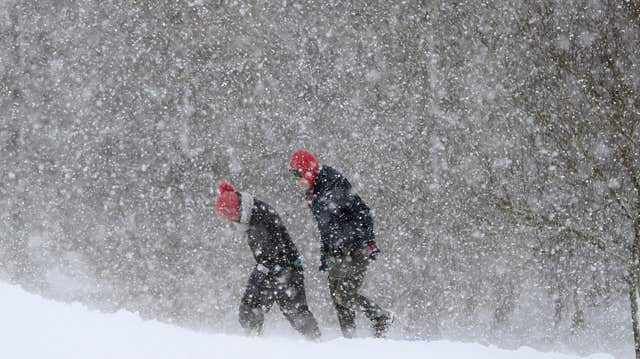
The number of people who died during the colder winter months in England has reached a five-year high, new figures show.
There were 153,717 deaths registered in England between January and March – the highest figure for the same quarter in the last five years, according to the Office for National Statistics (ONS).
More deaths occurred on almost every day between January and March compared with the five-year average, the ONS said.
Between January and March 2018, there were 153,717 deaths registered in England. There were more deaths in this Q1 period than the same Q1 periods in each of the last five years https://t.co/hzicNQzn3I
— ONS (@ONS) June 18, 2018
The finding is possibly due to a combination of flu and “uncharacteristically cold spells” in February and March, officials said.
A combination of the weather systems nicknamed the Beast from the East and Storm Emma led to bitterly cold weather across the UK earlier this year.
The adverse weather caused travel chaos, while thousands of schools had to shut their doors and some hospitals cancelled non-urgent appointments.
Both February and March were colder than average with a particularly cold snap occurring between February 22 and March 3.
The new experimental data from the ONS shows that deaths began to climb well above the five-year average during this cold spell and remained high for almost two weeks after temperatures began to rise.

Overall there were 153,717 deaths registered in England in the first quarter of the year. This compares with 132,409 deaths in 2013, 123,068 in 2014, 145,570 in 2015, 132,728 in 2016 and 144,087 in 2017, according to the ONS.
The ONS said that had the mortality rate in quarter one 2018 been the same as the average rate observed in quarter one of 2013 to 2017, it would have expected to see 142,946 deaths.
“If these average mortality rates had continued, we would have expected to see 10,771 fewer deaths in quarter one 2018 than were actually registered,” officials wrote.
“That is, the number of deaths registered in quarter one 2018 was around 8% higher than expected (based on the average mortality rate between 2013 and 2017).”
Meanwhile, the official data body also produced experimental data on improvements in mortality rates.
It concluded that a statistically significant slowdown in the long-term improvement in age-standardised mortality rates for England and Wales took place around the early 2010s.
The finding follows research from academic Sir Michael Marmot, director of UCL’s Institute of Health Equity, who last year warned that improvements in life expectancy have almost “ground to a halt”.
He found that the rate of increase in life expectancy in England had dropped by almost 50% since 2010.


Comments: Our rules
We want our comments to be a lively and valuable part of our community - a place where readers can debate and engage with the most important local issues. The ability to comment on our stories is a privilege, not a right, however, and that privilege may be withdrawn if it is abused or misused.
Please report any comments that break our rules.
Read the rules here